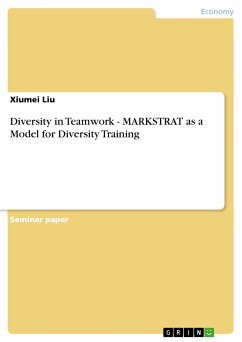Seminar paper from the year 2007 in the subject Business economics - Offline Marketing and Online Marketing, grade: 1,3, University of Kassel, language: English, abstract: Team ability and social competence are crucial in the new economy. In the globalized world, where the workforce is becoming increasingly diverse, working in diverse teams is even more important. What the effects of diversity on teamwork are and how the ability to work in diverse teams can be trained are questions that the author is interested to explore in this research paper. In doing so, Chapter I takes a theoretical approach by starting to explain diversity in the workforce as a trend as well as the types of diversity. Since diversity has contrasting effects on teamwork, both disadvantages and advantages are analysed in the third section. In order to make use of the positive aspects of working in diverse teams and still avoid or minimize the negative effect of differences at the same time, diversity should be effectively managed, which is discussed in the last section of Chapter I. Admittedly, diversity training can only be achieved by working in a diverse team. How can the ability to work in diverse teams be trained at universities? Chapter II intends to answer this question by providing the example of MARKSTRAT as a means of creating heterogeneous learning teams. As the paper shows, by bringing together students from eight universities with seven different nationalities, Markstrat Slagelse 2007 created an opportunity for students to not only teach them skills implementing marketing strategies but also enable them to collect the most valuable experience by working in culturally, socially, gender- and age-diverse teams. In order to present the work process in it, one team has been singled out to depict team development and interpersonal interaction among its team members, including how they became acquainted with one another, where disagreements came from, what was done to resolve conflicts in order to improve common understanding and reach mutual decisions. In order to vividly describe the dynamics of cooperation in this group, four phases including forming, storming, norming, and performing have been differentiated. As a member of this team, the author bases the study of these interactions on direct participation and/ or observations of the work process. By exploring the effects of diversity in teamwork in both theory and practice, the author hopes to shed light on the importance of the constructive use of diversity in teamwork and thereby contribute to creating the awareness of diversity training.
Dieser Download kann aus rechtlichen Gründen nur mit Rechnungsadresse in A, B, BG, CY, CZ, D, DK, EW, E, FIN, F, GR, HR, H, IRL, I, LT, L, LR, M, NL, PL, P, R, S, SLO, SK ausgeliefert werden.









